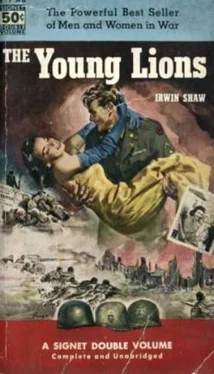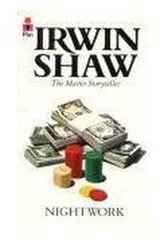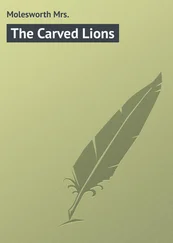Irwin Shaw - The Young Lions
Здесь есть возможность читать онлайн «Irwin Shaw - The Young Lions» весь текст электронной книги совершенно бесплатно (целиком полную версию без сокращений). В некоторых случаях можно слушать аудио, скачать через торрент в формате fb2 и присутствует краткое содержание. Жанр: Классическая проза, на английском языке. Описание произведения, (предисловие) а так же отзывы посетителей доступны на портале библиотеки ЛибКат.
- Название:The Young Lions
- Автор:
- Жанр:
- Год:неизвестен
- ISBN:нет данных
- Рейтинг книги:4 / 5. Голосов: 1
-
Избранное:Добавить в избранное
- Отзывы:
-
Ваша оценка:
- 80
- 1
- 2
- 3
- 4
- 5
The Young Lions: краткое содержание, описание и аннотация
Предлагаем к чтению аннотацию, описание, краткое содержание или предисловие (зависит от того, что написал сам автор книги «The Young Lions»). Если вы не нашли необходимую информацию о книге — напишите в комментариях, мы постараемся отыскать её.
The Young Lions — читать онлайн бесплатно полную книгу (весь текст) целиком
Ниже представлен текст книги, разбитый по страницам. Система сохранения места последней прочитанной страницы, позволяет с удобством читать онлайн бесплатно книгу «The Young Lions», без необходимости каждый раз заново искать на чём Вы остановились. Поставьте закладку, и сможете в любой момент перейти на страницу, на которой закончили чтение.
Интервал:
Закладка:
Cahoon was quiet and abstracted and Michael could tell that he was in pain from his ulcer, although he insisted upon drinking an old-fashioned at the bar before going to their table. Michael had never seen Cahoon have a drink before.
They sat down at one of the booths to wait for Milton Sleeper, the author of the play Cahoon was working on, and for Kirby Hoyt, a movie actor whom Cahoon hoped to induce to play in it.
Cahoon stared gloomily at two comedians who were making their way along the bar, laughing loudly and shaking hands with all the drinkers. "This town," he said. "I'd give the Japanese High Command five hundred dollars and two seats to the opening nights of all my plays if they'd bomb it tomorrow. Mike," he said, without looking at Michael, "I'm going to say something very selfish."
"Go ahead," Michael said.
"Don't go in till we get this play on. I'm too tired to get a show on by myself. And you've been in on it since the beginning. Sleeper's a horrible jerk, but he's got a good play there, and it ought to be done…"
"Don't worry," Michael said softly, half afraid already that he was leaping at this honourable excuse in friendship's name to remain aloof from the war for another season. "I'll hang around."
"They'll get along without you," Cahoon said, "for a couple of months. We'll win the war anyway."
He stopped talking. Sleeper was threading his way through the crowd towards their booth. Sleeper dressed like a forceful young writer, dark blue work shirt and a tie that was off to one side. He was a handsome, heavy-set, arrogant man, who had written two inflammatory plays about the working class several years before. He sat down without shaking hands.
"Double Scotch," Sleeper said to the waiter. "Well," he said loudly, "Uncle Sam has finally backed his tail into the service of humanity."
"Did you rewrite Scene Two yet?" Cahoon asked.
"For Christ's sake, Cahoon!" Sleeper said. "Do you think a man can work at a time like this?"
"Just thought I'd ask," said Cahoon.
"Blood," said Sleeper, sounding, Michael thought, like a character in one of his plays. "Blood on the palm trees, blood on the radio, blood on the decks, and he asks about the second scene! Wake up, Cahoon. A cosmic moment. Thunder in the bowels of the earth. The human race is twisting, tortured and bleeding in its uneasy sleep."
"Save it," said Cahoon, "for the trial scene."
"Cut it." Sleeper glowered heavily under his heavy, handsome eyebrows. "Cut those brittle, Broadway jokes. That time's past, Cahoon, passed for ever. The first bomb yesterday dropped right in the middle of the last wisecrack. Where's the Ham?" He looked around him restlessly, tapping the table in front of him.
"Hoyt said he'd be a little late," Michael said. "He'll be here."
"I've got to get back to the studio," said Sleeper. "Freddie asked me to come in this afternoon. The studio's thinking of making a picture about Honolulu to awaken the American people."
"What're you going to do?" Cahoon asked. "Are you going to have time to finish the play?"
"Of course I am," said Sleeper. "I told you I would, didn't I?"
"Yes," said Cahoon. "That was before the war started. I thought you might go in…"
Sleeper snorted. "To do what? Guard a viaduct in Kansas City?" He took a long sip of the Scotch the waiter placed before him. "The artist doesn't belong in uniform. The function of the artist is to keep alive the flame of culture, to explain what the war is about, to lift the spirits of the men who are grappling with death. Anything else," he said, "is sentimentality. In Russia they don't take the artist. Write, they say, play, paint, compose. A country in its right mind doesn't put its national treasurers in the front line. What would you think if the French had put the Mona Lisa and Cezanne's self-portrait in the Maginot Line? You'd think they were crazy, wouldn't you?"
"Yes," Michael said, because Sleeper was glaring at him.
"Well," Sleeper shouted, "why the hell should they put a new Cezanne, a living Da Vinci there? Christ, even the Germans keep their artists at home! God, I get so weary of this argument!" He finished his Scotch and looked furiously around him. "I can't stand a tardy Ham," Sleeper said. "I'm going to order my lunch."
Hoyt came in while Sleeper was ordering and made his way quickly to their table, shaking hands with only five people in his passage.
"Sorry, old man," Hoyt said as he slipped on to the green leather bench behind the table. "Sorry I'm late."
"Why the hell," Sleeper asked pugnaciously, "can't you get any place on time? Wouldn't your public like it?"
"Confusing day at the studio, old man," Hoyt said. "Couldn't break away." He had a clipped British accent which had never varied in the seven years he had been in the United States. He had taken out American citizenship papers when the war began in 1939, but otherwise he seemed exactly the same handsome, talented young toff, via Pall Mall out of the Bristol slums, who had got off the boat in 1934. He looked distracted and nervous and ordered a very light lunch. He did not order a drink because he had a tiring afternoon ahead of him. He was playing an RAF Squadron Leader and there was a complicated scene in a burning plane over the Channel, with process shots and difficult close-ups.
Lunch was a tense affair. Hoyt had promised to re-read the play over the week-end and give Cahoon his final decision about whether he would appear in it. He was a good actor and just right for the part, and if he didn't play it, it would be a difficult job to find another man. Sleeper kept drinking double Scotches gloomily and Cahoon poked drably at his food.
Michael saw Laura at a table across the room with two other women, and nodded coolly at her. It was the first time he'd seen her since the divorce. That eighty bucks a week, he thought, won't go far if she pays for her own lunch in this place. He was angry with her for being improvident and then was annoyed at himself for worrying about it. She looked very pretty and it was hard to remember that he was angry with her and also hard to remember that he had ever loved her. Another face, he thought, that will pull vaguely and sadly at the heart when glimpsed by accident at one end of the country or another.
"I've re-read the play, Cahoon," Hoyt said, a little hurriedly, "and I must say I think it's just beautiful."
"Good." Cahoon started to smile broadly.
"… But," Hoyt broke in a little breathlessly, "I'm afraid I can't do it."
Cahoon stopped smiling and Sleeper said, "Oh, Christ."
"What's the matter?" Cahoon asked.
"At the moment…" Hoyt smiled apologetically. "With the war and all. Change of plans, old man. Truth is, if I went into a play, I'm afraid the bloody draft board'd clap its paws on me. Out here…" He took a mouthful of salad. "Out here it's a somewhat different case. Studio says they'll get me deferred. The word is from Washington that movies'll be considered in the national interest. Necessary personnel, y' know… Don't know about the stage. Wouldn't like to take a chance. You understand my position…"
"Sure," said Cahoon flatly. "Sure."
"Christ," said Sleeper. He stood up. "Got to go back to Burbank," he said. "In the national interest." He walked out heavily and a bit unsteadily.
Hoyt looked after him nervously. "Never liked that chap," he said. "Not a gentleman." He chewed tensely on his salad.
Rollie Vaughn appeared at the table, red-faced and beaming, with a glass of brandy in his hand. He was English, too, older than Hoyt, and was playing a Wing Commander in Hoyt's picture. But he was not on call for the afternoon and could safely drink.
"Greatest day in England's history," he said happily, beaming at Hoyt. "The days of defeat are over. Days of victory ahead. To Franklin Delano Roosevelt." He lifted his glass and the others politely lifted theirs, and Michael was afraid that Rollie was going to heave the glass into the fireplace, now that he was in the RAF at Paramount. "To America!" Rollie said, lifting his glass again. What he's really drinking to, Michael thought unpleasantly, is the Japanese Navy, for getting us in. Still, you couldn't blame an Englishman…
Читать дальшеИнтервал:
Закладка:
Похожие книги на «The Young Lions»
Представляем Вашему вниманию похожие книги на «The Young Lions» списком для выбора. Мы отобрали схожую по названию и смыслу литературу в надежде предоставить читателям больше вариантов отыскать новые, интересные, ещё непрочитанные произведения.
Обсуждение, отзывы о книге «The Young Lions» и просто собственные мнения читателей. Оставьте ваши комментарии, напишите, что Вы думаете о произведении, его смысле или главных героях. Укажите что конкретно понравилось, а что нет, и почему Вы так считаете.











